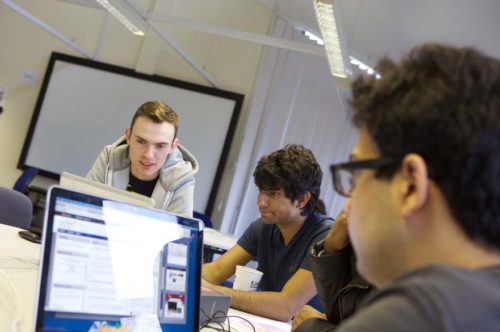Opis tego kierunku w języku polskim znajdziesz tu>>
https://studiawanglii.pl/courses/podstawy-psychologii-klinicznej-msc/
COURSE OVERVIEW
Work with world-leading researchers in understanding mental health problems and making a difference to people’s lives. Gain both a theoretical and practical understanding through guest lectures, industry-standard facilities and our Lived Experience Project.
Our course is geared to take you closer to your career goals. Its relevance is grounded in learning from research-active staff, with guest lectures from practicing clinical psychology lecturers.
If you’re looking to pursue a career as a qualified psychologist, or in related mental health areas, our course gives you the preparation for further clinical psychology training. You’ll learn to assess and understand the complex issues many people living with mental health problems suffer from, examining ways to help manage these and find appropriate treatment. You’ll graduate with both the theoretical knowledge and practical tools to work within mental health services and clinical psychology, as well as be equipped with the skills to apply scientific and research methods.
Please note that this course does not include clinical work with children, patients or mental health service users. This course does not constitute professional training, though it can support entry to a Doctorate in Clinical Psychology (or equivalent). We encourage you to seek out relevant paid or voluntary experience while completing your studies; our course is designed to facilitate this.
CAREERS
With statistics suggesting 1 in 4 people live with or experience a mental health problem in their lifetime, there is a great demand for trained professionals. Our course will provide you with the academic and research skills you need to continue onto further professional training in clinical psychology. Alternatively it provides an excellent basis to work in other mental health and care environments. You’re also in the perfect position to continue your academic career and move up to our Psychology PhD.
MODULES & ASSESSMENT
-
Issues in Scientific Research
This module is designed to help introduce you to the theoretical and practical complexities of the research process. The module will cover both qualitative and quantitative techniques, and it is aimed as a series of taster sessions. If you feel any of the techniques suits your research, your supervisor, and expert members of staff, will help you learn more about your chosen technique. Research training in the form of literature searching, constructing literature reviews, communicating and publicising your work will also be covered. Additional areas to be covered in this module include: The research process, research techniques, research ethics and scientific writing skills. This module is delivered face-to-face over 24h of lectures (2h per week) and requires 264h of student managed learning (11 hours for workshop preparation, 75h for reading and writing essays and 78 h for writing the portfolio) totalling 288h hours of learning activities. -
Mental Health and Distress: Approaches to Assessment and Diagnosis
Study the aetiology of mental health problems, as well as assessment and diagnosis. We’ll take an explicitly critical approach to diagnosis of mental health problems, by considering not only the biological risk factors, but giving more attention to the psychological and sociocultural risk factors. You’ll explore the current debates and controversies around diagnosis, drawing on psychiatric, psychological and sociological theories, taking a critical biopsychosocial approach to understanding the aetiology and diagnosis of mental health problems. You’ll also explore the process of assessment in clinical psychology that takes into consideration psychological and sociocultural factors, such as gender and culture. Delivered through lectures that will involve both taught content and interactive discussion, you’ll be assessed through one coursework assignment. You’ll develop an understanding of mental health problems and their diagnosis, essential if you’re considering further professional training and careers in clinical work with adults. -
Quantitative Research Methods
Develop a critical understanding of the principles of data collection and analysis for psychology and consider the theoretical basis of advanced quantitative methods. You will analyse example data sets using general linear models such as ANOVA, MANOVA, ANCOVA, multiple linear regression, and factor analysis. You will learn about good reporting practices and will learn how to report and interpret complex results. These chosen statistical methods have been directed by the Economic and Social Research Council’s Postgraduate Training Guidelines (fourth and fifth editions). -
Clinical Formulation and Treatment
This module aims to provide students with knowledge about the formulation and treatment process of different mental health problems in adults. The module covers an assortment of approaches used in formulation, including for example the broader biopsychosocial approach and specific approaches such as cognitive behavioural. Students will also learn about an assortment of therapeutic interventions relating to adult mental health difficulties alongside formulation. Students will also learn about professional practice issues including supervision, professional registration and ethics. The module will be delivered through lectures that will involve both taught and interactive discussion and two workshops where students will apply theoretical knowledge to developing basic counselling/communication skills. Focus on the importance of the therapeutic relationship will be emphasised in both lectures and workshops. The module is assessed through a combination of two coursework assignments and observation. The module provides an opportunity to understand theoretical aspects, challenges and the practicalities in formulation and treatment in clinical psychology, which will be useful for students considering further professional training and careers in clinical work with adults. -
Masters Project
You’ll chose an independent research topic from an area of expertise within our department (subject to availability of suitable supervision) and will conduct a significant research project in that area which may involve a literature review, data collection, analysis and a write-up. The final piece of work should be equivalent to a maximum of 12,000 words.
Assessment
You’ll have the opportunity to demonstrate your skills and knowledge through a range of methods including essays, exams, portfolios, presentations, debates, data analysis and a dissertation.




















